In 2004, Harvard’s Center on the Developing Child released a brief explaining that all early education and care programs should balance their focus on cognitive skills with significant attention to social and emotional development. The brief notes that providers must possess the knowledge and skills to assist young children who experience emotional and behavioral difficulties early in life, such as aggression, hyperactivity, and attention difficulties. To help achieve this, training in the social and emotional development of young children should be incorporated into both pre-service and in-service professional development. Additionally, the brief recommends that all early education and care programs have access to mental-health professionals trained to assist young children whose emotional and behavioral difficulties cannot be adequately addressed by front-line staff.
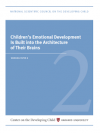
National Scientific Council on the Developing Child, Children’s Emotional Development Is Built into the Architecture of Their Brains: Working Paper 2 (Cambridge, MA: Harvard Center on the Developing Child, 2004).
The 2015 Transforming the Workforce for Children Birth Through Age 8: A Unifying Foundation notes that the development of social and emotional skills, such as the ability to manage emotions and behavior and establish positive relationships with peers, are critical for academic success at the pre-K and K–12 levels. A secure parent-child attachment sets the foundation for the healthy development of these skills. These skills are also developed by knowledgeable educators who set developmentally appropriate expectations, provide predictable routines, and guide children in developing skills of self-management.
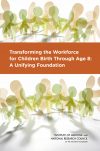
LaRue Allen and Bridget B. Kelly, eds., Transforming the Workforce for Children Birth Through Age 8: A Unifying Foundation (Washington, DC: National Academies Press, 2015).
Promoting positive behavior in young children also requires that early educators become aware of their own biases in labeling or setting expectations for young children. A 2016 research brief from the Yale University Child Study Center examined the ways that teachers’ and caregivers’ views of children can be affected by unconscious stereotypes related to skin color and gender as opposed to observing closely what the children are actually doing or trying to say. For example, a teacher may perceive a young Black boy who speaks out as being disruptive or aggressive, whereas the teacher may not make the same judgment if the child were a White girl. Racial disparities are particularly acute in cases of suspension and expulsion. “Racial disparities in discipline begin in the earliest years of schooling,” according to the U.S. Department of Education’s Office of Civil Rights, which reported in 2014 that while Black boys comprise only 18 percent of preschool enrollees, they represent 42 percent of preschool suspensions once and 48 percent of suspensions more than once. Black girls are also more likely than any other race of girl to be suspended.
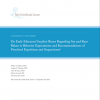
Walter S. Gilliam, Angela N. Maupin, Chin R. Reyes, Maria Accavitti, and Frederick Shic, Do Early Educators’ Implicit Biases Regarding Sex and Race Relate to Behavior Expectations and Recommendations of Preschool Expulsions and Suspensions? (New Haven, CT: Yale University Child Study Center, 2016). Available at https://medicine.yale.edu/childstudy/zigler/publications/Preschool%20Implicit%20Bias%20Policy%20Brief_final_9_26_276766_5379_v1.pdf.

Civil Rights Data Collection Data Snapshot: School Discipline (U.S. Department of Education Office of Civil Rights, 2014). Available at
https://ocrdata.ed.gov/Downloads/CRDC-School-Discipline-Snapshot.pdf.

U. S. Department of Health & Human Services, Early Childhood Development, Office of the Administration for Children and Families, “Reducing Suspension and Expulsion Practices in Early Childhood Settings” (webinar series), updated on May 8, 2017. Available at https://www.acf.hhs.gov/ecd/child-health-development/reducing-suspension-and-expulsion-practices.

Maryam Adamu and Lauren Hogan, Point of Entry: The Preschool-to-Prison Pipeline (Washington, DC: Center for American Progress, 2015). Available at
https://cdn.americanprogress.org/wp-content/uploads/2015/10/08000111/PointOfEntry-reportUPDATE.pdf.
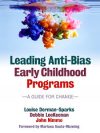
Louise Derman-Sparks, Debbie LeeKeenan, and John Nimmo, Leading Anti-Bias Early Childhood Programs: A Guide for Change (New York: Teachers College Press, 2015).
Challenging behaviors do not emerge out of nowhere. Educators who have training in how to understand the context of a child’s home environment can gain insight into why a child might be behaving in certain ways. For example, studies have shown that children living in poverty often have disrupted sleep, due to being moved around, feeling hungry, or living in overcrowded conditions; research shows that sleep disruption affects children’s ability to exhibit self control and regulate their behavior. Other factors to impact a child’s ability to self-regulate include chronic neglect, exposure to violence, and the unpredictability that comes with having a primary caregiver who suffers from alcoholism, opioid or other substance abuse, or mental illness. The fortunate news is that sustained and intentional interactions with caring, responsive adults can mitigate these traumas and help children develop skills to regulate their emotions, thoughts, and behavior. As stated in a recent series on self-regulation by the Administration of Children and Families: “all children have the capacity to develop these skills with effective instruction.”

Amanda R. Tarullo, Jelena Obradovic, and Megan R. Gunnar, “Self-Control and the Developing Brain,” Zero to Three 29, no. 3 (January 2009): 31–37.
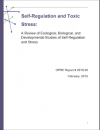
Amar Hamoudi, Desiree W. Murray, Lucy Sorensen, and Anika Fontaine, Self-Regulation and Toxic Stress: A Review of Ecological, Biological, and Developmental Studies of Self-Regulation and Stress (Durham, NC: OPRE and the Center for Child and Family Policy at Duke University, 2015). Available at
https://www.acf.hhs.gov/sites/default/files/opre/acf_report_2_rev_022415_final_508.pdf.

U. S. Department of Health & Human Services, Office of Planning, Research, & Evaluation in the Office of the Administration for Children & Families, “Toxic Stress and Self-Regulation Reports: Project Overview,” updated on April 4, 2018. Available at
https://www.acf.hhs.gov/opre/research/project/toxic-stress-and-self-regulation-reports.
Multiple studies on the effects of Early Childhood Mental Health Consultation (ECMHC) suggest it may be a promising intervention to support children’s social-emotional development. In 2016, a study found that children who received ECMHC through Connecticut’s Early Childhood Consultation Partnership had lower rates of “hyperactivity, restlessness, externalizing behaviors, problem behaviors, and total problems compared with children in the control group even after controlling for gender and pretest scores.” Two evaluation studies, one conducted in 2011 and the other in 2013, on Washington DC’s ECMHC have found positive results from the program. In DC’s ECMHC, four full-time, licensed professionals provide services aimed at building the capacity of directors and staff to reduce challenging behaviors and promote positive social-emotional development. The studies found that the number of children expelled from DC centers was less than half of the national average and there were statistically significant improvements in classroom emotional climates.

Walter S. Gilliam, Angela N. Maupin, and Chin R. Reyes, “Early Childhood Mental Health Consultation: Results of a Statewide Random-Controlled Evaluation,” Journal of the American Academy of Child & Adolescent Psychiatry 55 (September 2016): 754–761. Available at
https://www.jaacap.org/article/S0890-8567%2816%2930283-0/abstract.
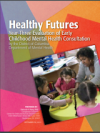
Deborah F. Perry, Healthy Futures: Year Three Evaluation of Early Childhood Mental Health Consultation (Washington DC: Georgetown University Center for Child and Human Development, 2013). Available at
https://dbh.dc.gov/sites/default/files/dc/sites/dmh/publication/attachments/HealthyFuturesThreeYearEvaluationReport.pdf.
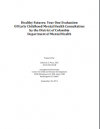
Deborah F. Perry, Healthy Futures: Year One Evaluation of Early Childhood Mental Health Consultation (Washington DC: Georgetown University Center for Child and Human Development, 2011). Available at
https://dbh.dc.gov/sites/default/files/dc/sites/dmh/publication/attachments/Children%20Youth%20and%20Family%20Services%20Healthy%20Futures%20Year%20One%20Report.pdf.
In her book Grit: The Power of Passion and Perseverance, Angela Duckworth identifies “grit,” defined as a combination of passion and perseverance, as a critical component of a person’s success. And Nobel Laureate James Heckman finds that social-emotional skills, like grit, are developed during a child’s early years. Heckman states in his 1999 working paper: “an important lesson to draw from the Perry Preschool program, and, indeed the entire literature on successful early interventions, is that it is the social skills and motivation of the child that are more easily altered—not IQ. These social and emotional skills affect performance in school and in the workplace.”

Angela Duckworth, Grit: The Power of Passion and Perseverance (New York: Scribner, 2016).
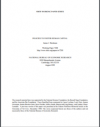
James Heckman, Policies to Foster Human Capital: Working Paper 7288 (Cambridge, MA: National Bureau of Economic Research, 1999). Available at
http://www.nber.org/papers/w7288.